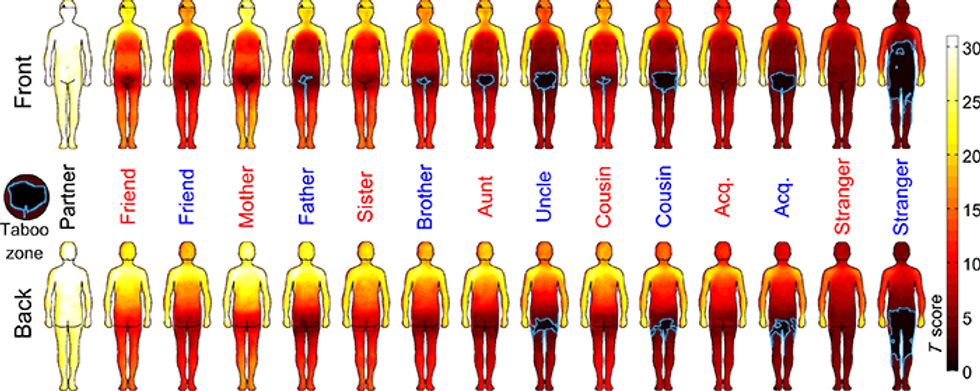
Researchers collected data through a survey to create a topographical "touch space map," showing where men and women are OK with and not OK with being touched by different people. (Image source: Aalto University)

Some people just do not like being touched (you know who you are), while others are just more hands on.
For the average person though, just where someone can another person, if at all, touch largely depends on who they are.
Researchers from the University of Oxford in the U.K. and Aalto University in Finland published a "touch space map" this week, accompanying a study published in the Proceedings of the National Academy of Sciences, on this touchy-feely topic.
"It is the relationship rather than familiarity that matters," Oxford University’s professor Robin Dunbar said in a statement about the research team's observations. "A friend we haven’t seen for some time will still be able to touch areas where an acquaintance we see every day would not."

The survey of more than 1,300 men and women from five different countries was not surprising in many respects but did yield some unexpected results. Here's more from the news release on some of the findings:
Some results are unsurprising. For example, the maps confirm that women are uncomfortable with being touched by male strangers on most of their body, while men do not want relatives of either gender to touch their genitals. British people are less comfortable with touching than people from the other countries sampled (Finland, France, Italy and Russia). In general, regardless of nationality, the closer the relationship, the greater the area that can be touched.[...]
Other results were less expected. Italians were less comfortable with being touched than Russians, while overall Finns were the most comfortable with being touched. Also, our willingness to be touched does not fade over time.
Overall the researchers found that "cultural influences were minor" when it came to who could touch where.
"We suggest that these relation-specific bodily patterns of social touch constitute an important mechanism supporting the maintenance of human social bonds," the study authors wrote.
Lauri Nummenmaa with Aalto said that the findings "emphasize the importance of non-verbal communication in social relationships."
(H/T: Popular Science)